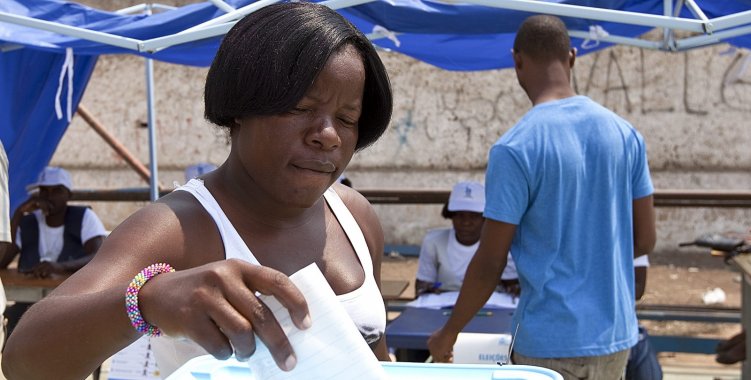The president of the CNE, Manuel Pereira da Silva, appealed this Tuesday to the magistrates and the police of Angola to prevent the possible concentration of citizens next to the polling stations after they have voted, making "comply with the law".
Three magistrates contacted by Lusa considered consensual that the CNE "does not command" the Public Prosecutor's Office, and that "each State body knows its role". The adequacy of Pereira da Silva's appeal was considered "unnecessary" by some and "pedagogical" and "legitimate" by others.
The CNE considers the appeal of civil society – namely the “Votou, Sentou” movement – and the opposition, which have encouraged voters to remain in polling stations after the vote on 24 August, a violation of the law.
"The organic electoral law has a rule that stipulates that the forces of order are responsible for preventing people who are intoxicated or who may disturb polling stations from being kept at a distance of up to 500 meters", acknowledged Benja Satula.
"The problem, I believe, is the interpretation of the rule. There is every reason for the forces of order to prevent the disruption of elections by people who are drunk or even by people who, not being drunk, want to disrupt the vote. what is foreseen - and therefore this position of the president of the CNE seems unnecessary to me - is that people who want to observe what is happening in the assembly in an orderly way are prevented from doing so", added the lawyer.
In complete opposition to this position, Sebastião Vinte Cinco considers that the issue "has to do with the safety of those who are voting and who are thinking of coming to vote" and that "any situation of disturbance that may jeopardize the exercise of the right to vote" must be "cautious".
"People may feel inhibited from exercising their right to vote, precisely for fear of being involved in a disturbance, in an act of public disturbance that may have consequences for their physical integrity", added the lawyer.
"It is necessary to ensure that this movement [Voted, Sat] does not inhibit citizens from leaving their homes to exercise their right to vote," he defended.
Sebastião Vinte Cinco also drew attention to another rule of the electoral law, which establishes that any act of disturbance capable of suspending or preventing the beginning of the voting process for a limit of five hours is a justification for the annulment of the elections and consequent repetition in the maximum period of eight days thereafter.
"Imagine a scenario in which this movement [Voted, Sat] gets out of control, which is even normal given that there are many people. In the worst scenario, the entire electoral process could be called into question", he said.
The question that arises – according to an Angolan constitutionalist, who spoke on condition of anonymity – “is the cluster of people around the polling stations, which can eventually cause discomfort or disturbance of the vote, which is illegal”.
The same legal expert drew attention to the circumstance that "many polling stations" will operate "outdoors, in very precarious places", so that "the gathering of people around the polling station can constrain the exercise of the right to of vote".
"Whenever there are elections, the CNE carries out some training sessions with various bodies, with the police, with the Public Ministry, with journalists, with a series of entities to explain, even because, unfortunately, at each election we have a new law. This act was, therefore, above all a pedagogical action, to make the law known", he also explained.
"That's how I understood the action of the CNE. Now, the CNE does not rule the MP. The decision to take any action against people who disturb the exercise of the right to vote is and will always be the MP", he underlined.
In Satula's "interpretation of the electoral law", the appeal of the Votou-Sentou movement does not prevent people who are not intoxicated and who are not disturbing from being near polling stations, "at a considerable distance, even less than 500 meters, as long as a work area is safeguarded, but they can observe what is happening in the assembly".
"I don't see that this can be the object of impediment or any sanctioning procedure on the part of the authorities. I think this is not the spirit of the law", added the lawyer, considering that the type of prevention actions by citizen groups such as He voted, he sat "can be very effective in guaranteeing the transparency of elections in large urban centers such as Luanda, Benguela, Huambo or Huíla".
"In areas with more difficult access, these movements will have little effectiveness," he said.
Already Sebastião Vinte Cinco anticipates more problems than benefits in actions with the proposal by Votou, Sentou. "There is a recent story, in 2021, in Zambia, where a movement similar to what is happening here was successful because its candidate was elected. But in our case, there will be delegates from all the lists" in all 12,512 polling stations, he said.
The lawyer maintained that the delegates "will have access to all the information on the votes and may, based on the minutes to which they will have access, have elements to check the final result of the elections".







